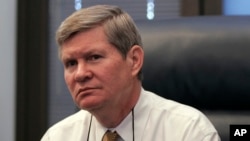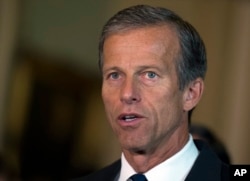Looks matter more than we may want to believe, and elections are no exception.
That’s what social scientists are finding in a growing body of research.
Carnegie Mellon University social psychologist Christopher Olivola finds that in conservative states, Democrats could pick up votes just by looking more Republican than their rivals.
"Ideally, people would not be choosing candidates based on these superficial qualities," Olivola deadpanned.
Olivola and colleagues showed participants pictures of unfamiliar candidates who ran against each other in recent elections. Subjects were asked to guess which one was the Republican and which was the Democrat.
There's no definition of who looks Republican or Democratic. However, participants guessed right a little more than half the time — better than randomly guessing.
But things got interesting when they guessed wrong.
You don't look like a Democrat...
Democratic candidates who were mistaken for Republicans more often got more votes in Republican-leaning states. You might expect that, right?
But the opposite was not true. Republicans who were mistaken for Democrats didn't win more votes in Democratic-leaning states.
An upcoming study will show the same effect in exit polls, Olivola said. "The people who identify themselves as Republican are more likely to vote for the Democrat who looks more like a Republican."
That doesn't mean Republicans are more superficial than Democrats, Olivola adds. Democrats are just as likely to vote for a candidate based on other qualities found in appearances. But in this one area — looking like you belong to the party — Republicans seem to be more easily swayed.
The effect is not enough to win an election by itself, Olivola noted. "Fortunately, people don't just vote on looks. But in a tied election, it could make the difference between winning and losing."
Face-ism
Olivola and others have been finding that people's looks count for much more than we think. Voters choose candidates who look more competent, based on a one-second look at a photograph.
Criminal defendants who look more trustworthy are less likely to be convicted. Military cadets who look more dominant are promoted to higher ranks than their classmates.
Competence, trustworthiness and dominance are hard to judge objectively. But what Olivola finds remarkable about Republicans choosing Democrats based on looks is, "when you go vote, you don't have to guess the political party. It's written on the ballots."
"It's really interesting that some set of people, maybe on the margins, who would presumably vote for a Republican can be swayed to vote for a Democrat if that person looks more conservative," he said.
Why does it happen?
"That's the billion-dollar question," he said. "I don't know." Olivola guesses it has something to do with face shapes.
Perhaps there is some value in jumping to conclusions based on appearances. Scientists are finding there are certain things we can tell just by looking -- or, at least, our odds at guessing right are better than a coin flip.
Trustworthy faces
Teenagers can tell trustworthy from untrustworthy people based solely on pictures of faces, and they get better at it as they get older. Their accuracy improved from 53 percent at age 13 to 60 percent at age 18 in one study.
In another study, participants could identify the least-charitable people from pictures of their faces 58 percent of the time.
"There's some signal there," says University of Toronto psychology professor Nick Rule. "There's still a substantial amount of noise. But from a scientific perspective this is really fascinating because something is getting through."
But is it enough to vote on? Absolutely not, said Rule.
When people don't know much about a candidate, they will go with their gut instinct, he says. "And your gut instinct is going to be governed by the way that you feel about people, which is going to have a lot to do with how they look.
"There's a lot of danger in that when you're making important decisions," Rule added.
The more people know about the candidates, the less they appear to be influenced by appearances, he noted.
So voter education is the best hope, Olivola said.
Or maybe candidates should wear bags over their heads?
"I think there's a point to be made for that," Olivola joked.





